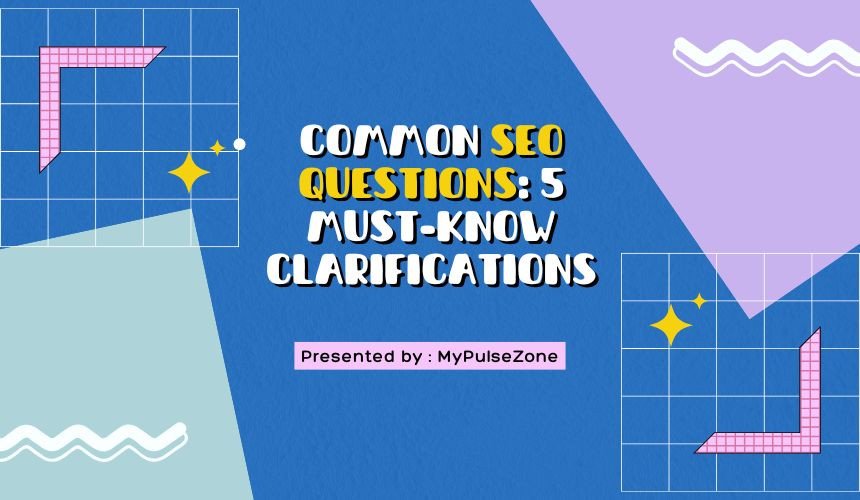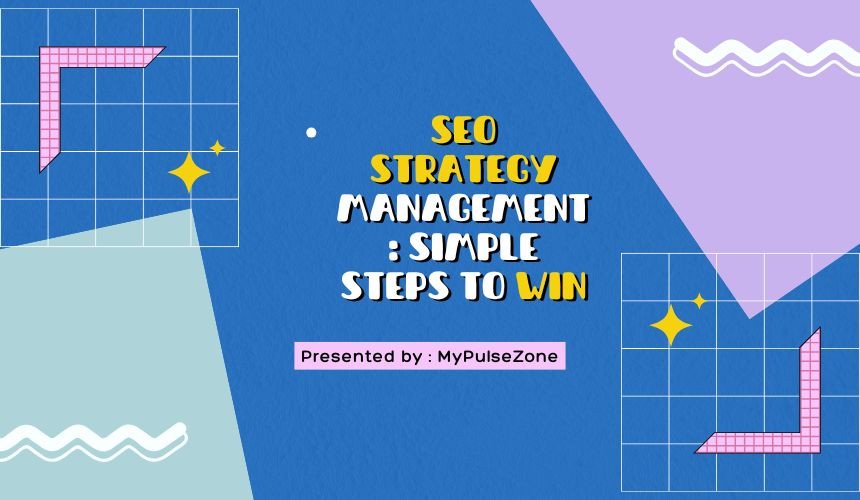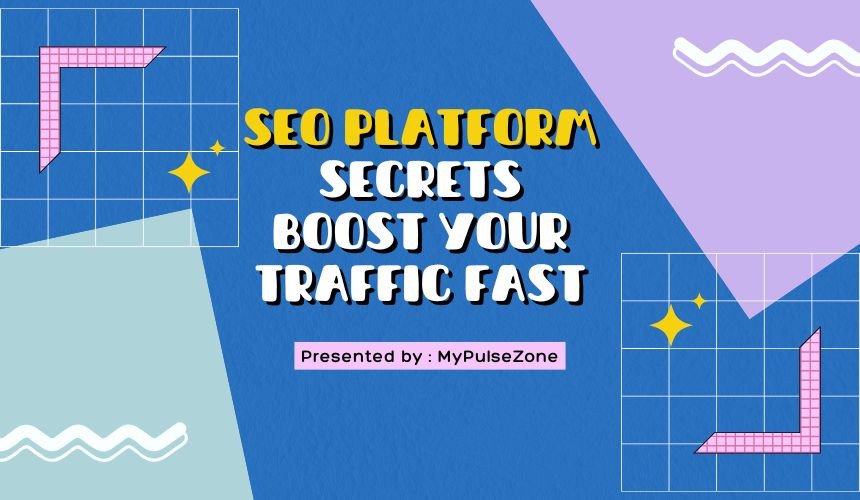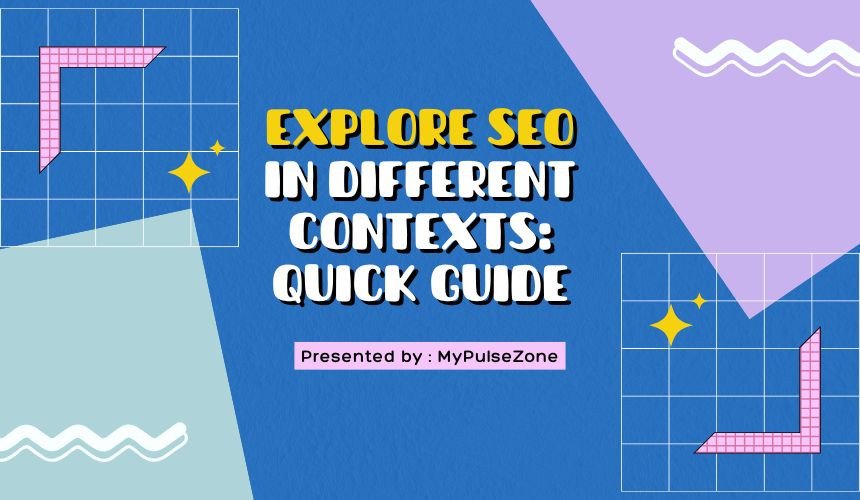
Common SEO Questions: 5 Must-Know Clarifications
Answers to 5 Common SEO Questions Revealed
Have you ever wondered, "What is SEO and SEM? ", or pondered the nuances of "What is SEO vs SEM? " Dive into the world of digital marketing with "Common SEO Questions & Clarifications. " Whether you're a beginner exploring "What is SEO for Dummies" or seeking insights on "What is SEO Slug," this article offers a comprehensive guide. Unravel the mysteries of "What is SEO Off-Page" and enhance your knowledge of "What is SEO Meta Description" for effective online visibility.
SEO Basics
SEO Basics are essential for online success. Understanding What is SEO and SEM is crucial. Differentiating between What is SEO vs SEM is key. What is SEO for Dummies provides a simple breakdown. Optimizing What is SEO Slug helps improve visibility. Utilizing What is SEO Off-Page techniques boosts rankings. Crafting a compelling What is SEO Meta Description drives click-throughs. grasping these fundamentals sets a strong foundation for effective SEO strategies.
What is SEO and SEM?
SEO (Search Engine Optimization) refers to the practice of optimizing your website to enhance its visibility and ranking on search engine results pages organically. On the other hand, SEM (Search Engine Marketing) involves using paid advertising to improve your visibility on search engines. While SEO focuses on organic strategies, SEM includes paid tactics like pay-per-click advertising. Both are crucial for boosting online presence and driving traffic to your site.
What is SEO vs SEM?
SEO and SEM are crucial aspects of digital marketing. SEO focuses on optimizing organic search results to increase website visibility and traffic, while SEM involves paid advertising to enhance visibility in search engine results. Understanding the differences between SEO vs SEM is essential for developing a comprehensive online marketing strategy. By leveraging both strategies effectively, businesses can improve their online presence and reach a wider audience in the competitive digital landscape.
What is SEO for Dummies?
SEO, or search engine optimization, is the practice of enhancing your website to increase visibility in search engine results. It involves optimizing website content and structure to rank higher in organic search results. By utilizing keywords, meta descriptions, and off-page SEO strategies, you can attract more organic traffic to your site. Understanding the basics of SEO is crucial for driving targeted traffic and improving your online presence.
What is SEO Slug?
SEO Slug is a significant part of optimizing web content for search engines. It refers to the URL of a specific webpage and plays a crucial role in improving SEO rankings. A well-crafted SEO slug includes relevant keywords that describe the content accurately. Using concise and descriptive slugs can enhance visibility and make it easier for search engines to understand the content of the page. This ultimately leads to higher organic traffic and better user engagement.
SEO Techniques
Exploring SEO techniques is essential for improving website visibility and ranking on search engines. Understanding SEO vs SEM, the significance of SEO for dummies, the role of SEO slug, the impact of SEO off-page strategies, and crafting effective meta descriptions can elevate your digital presence. By mastering these techniques, businesses can attract more organic traffic, enhance brand credibility, and drive conversions effectively.
What is SEO Off-Page?
Off-Page SEO refers to activities done outside a website to improve search engine rankings. It involves building quality backlinks, social media marketing, influencer collaborations, and online reputation management. These strategies boost a site's credibility, authority, and relevance, leading to higher organic traffic and better visibility in search results. Off-Page SEO is crucial for a holistic SEO approach, enhancing a website's overall presence and performance across the web.
What is SEO Meta Description?
A meta description in SEO is a brief summary of a webpage's content. It appears below the title tag in search engine results. This snippet informs users about the page's relevance before they click on it. Crafting compelling meta descriptions with relevant keywords can improve click-through rates. It's crucial to keep them concise, engaging, and within the recommended character limit for optimal performance in search results.
SEO Strategies
Crafting Effective SEO Strategies In the realm of digital marketing, having well-thought-out SEO strategies is paramount. Understanding the differences between SEO and SEM, optimizing meta descriptions, and enhancing off-page SEO are crucial for success. Implementing user-friendly SEO slugs and focusing on on-page and off-page optimizations can significantly boost your website's visibility and ranking on search engine results pages. It's essential to stay updated with the latest SEO trends to refine your strategies continuously.
SEO Tools
Are you wondering which tools can enhance your SEO strategy? Various software options help you optimize your website and track your performance. Tools like Google Analytics, SEMrush, and Moz offer valuable insights into keywords, backlinks, and competitor analysis. By utilizing these tools effectively, you can boost your search engine ranking and drive more traffic to your site. Stay ahead of the competition with the right SEO tools at your disposal!
Optimizing Content
Optimizing content involves enhancing it to improve its visibility and ranking on search engine results pages. By focusing on keywords, headings, meta descriptions, and user experience, you can boost your content's performance. Implementing SEO strategies such as creating quality content, using relevant keywords, and optimizing meta tags can help attract more organic traffic to your website.
Keyword Research
Understanding the significance of keyword research is crucial for enhancing your website's visibility on search engines. By identifying relevant search terms that your target audience uses, you can tailor your content to reach the right customers effectively. Through comprehensive keyword research, you can discover valuable insights into user intent, popular search queries, and trending topics. Implementing strong keywords strategically can drive organic traffic to your site and boost your search engine rankings significantly.
Content Quality
Content quality plays a vital role in SEO success. High-quality content is engaging, relevant, and valuable to readers, leading to better user experience and increased credibility. Ensuring your content is well-written, error-free, and optimized for search engines can significantly impact your website's ranking. By focusing on content quality, you can attract more organic traffic, improve user engagement, and establish your brand as an authority in your industry.
Optimizing Images
When optimizing images for SEO, ensure filenames are descriptive, like "seo-tips. jpg. " Write alt text that accurately describes the image. Compress images to improve page load speed. Use responsive images for different screen sizes. Include images relevant to your content for better user engagement. By following these image optimization tips, you can enhance your SEO efforts and improve your website's overall visibility.
Internal Linking
- It helps search engines understand the structure of your site and the significance of each page.
- By utilizing relevant anchor text, internal linking can improve user navigation and engagement.
- Proper internal linking can also distribute link equity throughout your site, boosting the ranking of important pages.
- Remember to keep internal links natural and strategic for the best results.
Measuring Success
- Regularly track metrics such as organic traffic, keyword rankings, bounce rates, and conversion rates.
- Utilize Google Analytics and other tools to gather data and analyze performance.
- Adjust strategies based on KPI insights to optimize SEO campaigns effectively.
- Measuring success ensures continuous improvement and helps achieve desired outcomes in online visibility and engagement.
SEO Analytics
Sure! Here is the content about "SEO Analytics": SEO Analytics refers to the measurement and analysis of data related to your website's search engine optimization efforts. It involves tracking key metrics such as organic traffic, keyword rankings, bounce rates, and conversion rates to evaluate the effectiveness of your SEO strategy. By using tools like Google Analytics and Search Console, you can gain valuable insights into user behavior, traffic sources, and the performance of your SEO campaigns.
Rank Tracking
- It involves tracking the positions of your website's pages on search engine results pages.
- Helps identify trends, measure the impact of optimization efforts, and adjust strategies accordingly.
- Utilizing specialized tools, you can track keyword rankings accurately over time.
- Regular rank tracking enables you to stay ahead of competitors and ensure continuous improvement in search visibility.
Conversion Tracking
SEO Reporting
SEO reporting is crucial for measuring the effectiveness of your SEO strategies. It involves analyzing key metrics to track website performance and visibility on search engines. By monitoring data such as organic traffic, keyword rankings, and backlinks, you can identify areas for improvement and make informed decisions to enhance your SEO efforts. Regular SEO reporting helps you assess the impact of your optimizations and adjust your approach for better results. In conclusion, understanding "Common SEO Questions & Clarifications" is crucial for enhancing online visibility. Knowing the disparities like SEO vs SEM and SEO off-page optimization is vital. Additionally, grasping fundamental concepts such as SEO for dummies, SEO slug, and meta descriptions can significantly boost website rankings. By addressing these inquiries comprehensively, businesses can elevate their digital presence and attract more organic traffic effectively.
-------FAQs-------
Q: What is SEO and SEM?
A: SEOstands for Search Engine Optimization, which involves optimizing website content to improve its visibility on search engines like Google.
SEM, on the other hand, stands for Search Engine Marketing and includes various strategies like paid advertising to increase a website's visibility.
Q: How does SEO differ from SEM?
A: SEO and SEM are both crucial digital marketing strategies, but they differ in their approach and goals.
SEO focuses on optimizing websites to improve organic search rankings and drive unpaid traffic, while SEM involves using paid advertising to increase visibility on search engine result pages.
SEO is a long-term strategy that aims for sustainable results, while SEM provides quicker but temporary visibility.
In essence, SEO is about optimizing for organic search traffic, whereas SEM encompasses paid search strategies.
Q: What is the purpose of an SEO slug?
A: The purpose of an SEO slug is to optimize the URL for search engines by including relevant keywords to improve visibility and ranking in search results.
Q: How important are off-page SEO strategies?
A: Off-page SEO strategies play a crucial role in enhancing a website's ranking on search engines.





